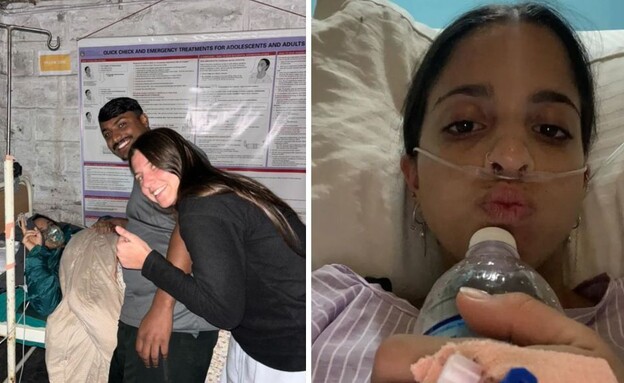At the makeshift hospital where Adi arrived, they immediately realized that it was carbon monoxide poisoning as a result of a gas leak and quickly connected her to oxygen. Over 40 tense minutes passed before she woke up and regained consciousness. “When I woke up I was stressed and confused, my body still convulsed, I was dizzy, I was nauseous, I didn’t recognize people nor the friends who went on the trek with us. I didn’t even remember that I was abroad.”
Mizrahi notes that at a later stage it became clear to the group that the gas leak occurred in almost all the rooms in the same guest house. “There were other people there who suffered from dizziness and lack of control of their hands, but they left the room in time and stayed away from the gas,” she stated in a Facebook post.
When Adi recovered a little, the group returned to the guest house where they were staying, and she had to be helped by her friends because she was unable to stand or walk on her own. “When we got to the room I vomited, which raised another suspicion of a head injury and concussion,” she says.
Following her condition and feelings, a rescue helicopter arrived in the village the next morning and Adi was hospitalized in a hospital in the city of Kathmandu, where she underwent extensive tests including blood tests and a head CT scan. Throughout this time, she says she was connected to an oxygen tube.
Only after four days, when the tests came back normal, Adi was released from the hospital. She was asked to come for another check-up, and the medical team instructed her to avoid going on treks, staying in high places or any strenuous physical activity for 10 days.
“In general, the showers in Nepal operate using gas boilers, like a small box attached to the wall inside the shower, and most of the rooms are also very small and not ventilated. It was the same in our hostel, it was a cramped room with a high, small window that was closed,” she explains.
Adi says that now she feels good, and on this occasion, she wishes to convey a message to all travelers who come to Nepal: “Most of the showers in the area are built in this way and it is important to know this and be careful about it – while bathing, make sure that all the windows are open and it is even important to leave the door open. It is recommended to take short showers and not To be alone in the room while showering.”
A situation that may cause severe and serious injury
Prof. Shay Efrati, director of the “Segol” Center for Hyperbaric Medicine at the Shamir Medical Center (Assaf Harofeh), explains that when a combustible material is heated, CO gas – carbon monoxide – is released into the air. According to him, unlike cooking gas, carbon monoxide does not contain an odor, so it cannot be seen or felt. “Many times, in a cold environment when heating is turned on, people hermetically close the room, and then the gas accumulates and does not drain. When its concentration increases in the body, it takes the place of oxygen in the body, and thus those who are exposed to it suffer from a lack of oxygen.”
The professor points out that the most severely damaged organs in such a situation are the brain and the heart. “The first sign is headaches or dizziness, and if you continue to stay in the same place where the gas accumulates, it may cause loss of consciousness and convulsions, as in the case of the young woman, and even end in a heart attack and death.” The professor adds that a lack of oxygen may also cause long-term dangers, caused by a brain injury until treatment is received, and by the accumulation of the gas in the body’s cells. According to him, this kind of injury manifests itself in memory, stability and coordination problems. “The longer it takes for the victim to receive proper treatment, the higher the chance of long-term damage.”
The treatment in such cases, according to him, is first to get away from the area immediately. He also states that in Western countries treatment will be given in pressure chambers to clean the carbon monoxide from the body, and in places where such treatment does not exist, oxygen treatment will be given.
The heating device found in the guest house where Adi and her cousin stayed, is a familiar device that is also used in Israel for heating water with gas. According to the professor, the Shamir Medical Center treats dozens of cases of carbon monoxide poisoning every year, some of them due to gas leaks from such heating devices. In order to reduce the risk, he recommends leaving a window open for ventilation in rooms where such heating devices are used, as well as making sure that proper tests are carried out for this type of device.
